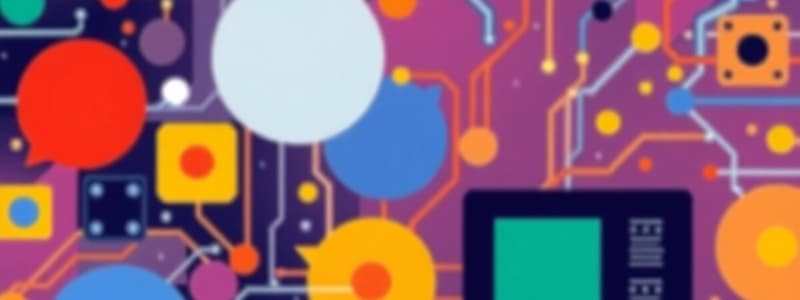Podcast
Questions and Answers
Which of the following is a key ethical concern in Information and Communication Technology (ICT)?
Which of the following is a key ethical concern in Information and Communication Technology (ICT)?
- Quality of internet connection
- Cost of ICT tools
- Accessibility of resources (correct)
- Popularity of social media platforms
Which component of ICT is responsible for physical processing and storage?
Which component of ICT is responsible for physical processing and storage?
- Networks
- Hardware (correct)
- Data
- Software
What role does software play in an ICT system?
What role does software play in an ICT system?
- Stores data permanently
- Transmits information between users
- Determines how hardware operates (correct)
- Connects devices over a network
What does cloud computing primarily involve?
What does cloud computing primarily involve?
Which of the following describes a local area network (LAN)?
Which of the following describes a local area network (LAN)?
Which of these trends in ICT is focused on large-scale data analysis?
Which of these trends in ICT is focused on large-scale data analysis?
In what way does ICT improve healthcare outcomes?
In what way does ICT improve healthcare outcomes?
What is essential to protect against unauthorized access and cyberattacks in the digital realm?
What is essential to protect against unauthorized access and cyberattacks in the digital realm?
What is a key benefit of applying ICT in education?
What is a key benefit of applying ICT in education?
Which option best describes the concept of the Internet of Things (IoT)?
Which option best describes the concept of the Internet of Things (IoT)?
Which of the following outcomes is NOT typically associated with the impact of ICT on society?
Which of the following outcomes is NOT typically associated with the impact of ICT on society?
How does ICT contribute to business efficiency?
How does ICT contribute to business efficiency?
Which of the following is an application of ICT in government?
Which of the following is an application of ICT in government?
Which ethical consideration addresses the issue of unauthorized usage of creative works?
Which ethical consideration addresses the issue of unauthorized usage of creative works?
What challenge is posed by rapid advancements in ICT regarding environmental sustainability?
What challenge is posed by rapid advancements in ICT regarding environmental sustainability?
What does the term 'data' refer to in the context of ICT?
What does the term 'data' refer to in the context of ICT?
Flashcards
What is ICT?
What is ICT?
Information and Communication Technology includes all technologies that store, retrieve, transmit, and manipulate information.
What is hardware?
What is hardware?
Hardware consists of physical parts like the computer's brain (CPU), memory (RAM), storage (hard drives), input devices (keyboard, mouse), and output devices (monitor, printer).
What is software?
What is software?
Software are instructions that tell the hardware what to do. They include operating systems like Windows or macOS, applications like Word or Excel, and utilities for maintaining the system.
What are networks?
What are networks?
Signup and view all the flashcards
What is data?
What is data?
Signup and view all the flashcards
How does ICT enable communication?
How does ICT enable communication?
Signup and view all the flashcards
What is ICT's impact on education?
What is ICT's impact on education?
Signup and view all the flashcards
How does ICT impact businesses?
How does ICT impact businesses?
Signup and view all the flashcards
Privacy in ICT
Privacy in ICT
Signup and view all the flashcards
Security in ICT
Security in ICT
Signup and view all the flashcards
Accessibility in ICT
Accessibility in ICT
Signup and view all the flashcards
Copyright in ICT
Copyright in ICT
Signup and view all the flashcards
Bias in AI/ML
Bias in AI/ML
Signup and view all the flashcards
Cloud Computing
Cloud Computing
Signup and view all the flashcards
Artificial Intelligence (AI)
Artificial Intelligence (AI)
Signup and view all the flashcards
Big Data
Big Data
Signup and view all the flashcards
Study Notes
Introduction to ICT
- ICT stands for Information and Communication Technology.
- It encompasses all technologies used to store, retrieve, transmit, and manipulate information.
- This includes hardware (computers, phones, etc.), software (applications, operating systems), and networks.
- The field continues to evolve rapidly with the development of new applications and devices.
Key Components of ICT
- Hardware: Physical components of a computer system, including the central processing unit (CPU), memory (RAM), storage devices (hard drives, SSDs), input devices (keyboard, mouse, scanner), and output devices (monitor, printer). Various types of peripherals extend functionality (e.g. speakers, microphones).
- Software: Programs that tell the hardware what to do, such as operating systems (Windows, macOS), applications (word processors, spreadsheets, web browsers), and utility software.
- Networks: Systems that connect different devices or computers together, allowing for communication and data sharing. This includes local area networks (LANs) and wide area networks (WANs) like the internet.
- Data: Raw facts, figures, and information, that ICT systems process, store and transmit. It may be structured (organized) or unstructured (unorganized).
- Communication: ICT enables the transmission and exchange of data and information between people.
Applications of ICT
- Education: ICT facilitates learning through online courses, educational software, virtual classrooms, and interactive resources. Improves accessibility in remote areas.
- Business: Businesses use ICT for e-commerce, online marketing, data analysis, customer relationship management, and project management. Improves efficiency and productivity, enabling globalization.
- Healthcare: ICT aids diagnosis, treatment, and patient monitoring. Remote patient care, electronic health records, and telemedicine are examples of its use. Improves patient outcomes via early detection and intervention.
- Government: ICT supports e-governance, including online services for citizens, streamlining administrative processes, and enhancing transparency. Important for citizen engagement and access to government services.
- Entertainment: ICT is central to many entertainment forms, including online gaming, streaming movies and music, social media, and virtual reality experiences. Increases accessibility to content and social interaction.
- Communication: ICT connects people globally, instantly facilitating communication and information sharing through email, instant messaging, video conferencing, social media, and mobile devices. Allows for remote collaboration and global connectivity.
Ethical Considerations in ICT
- Privacy: Protecting personal data and ensuring responsible data collection and usage are key ethical concerns.
- Security: Protecting computer systems and data from unauthorized access and cyberattacks is crucial.
- Accessibility: Ensuring that ICT systems and resources are available and usable to all individuals regardless of their background is essential.
- Copyright and Intellectual Property: Respecting intellectual property rights and addressing digital rights management issues, is vital in preventing unauthorized usage and infringement.
- Bias and Discrimination: Analyzing for and mitigating potential for bias in algorithms, data sets, and software is vital. Ensuring fairness in AI/ML implementations.
Trends in ICT
- Cloud Computing: Storing and accessing data and applications over the internet, rather than on a local device.
- Artificial Intelligence (AI): Using computer systems to perform tasks that typically require human intelligence, such as learning, problem-solving, and decision-making.
- Big Data: Analyzing large amounts of data to understand patterns, trends, and insights.
- Internet of Things (IoT): Connecting everyday objects to the internet, allowing them to communicate and exchange data.
- Mobile Technology: The increased use of smartphones and tablets for communication, information access, and entertainment.
- Cybersecurity: Ensuring data protection and computer security in the increasingly digital world. Increased sophistication of threats.
Impact of ICT
- Economic Growth: ICT drives innovation and economic growth by improving productivity and enabling new business models.
- Social Development: ICT promotes social inclusion by connecting people, providing access to information, and facilitating communication across borders.
- Environmental Concerns: Energy consumption and electronic waste are environmental concerns associated with rapid ICT advancements and the need for sustainable practices (e.g., energy-efficient technologies).
Studying That Suits You
Use AI to generate personalized quizzes and flashcards to suit your learning preferences.




